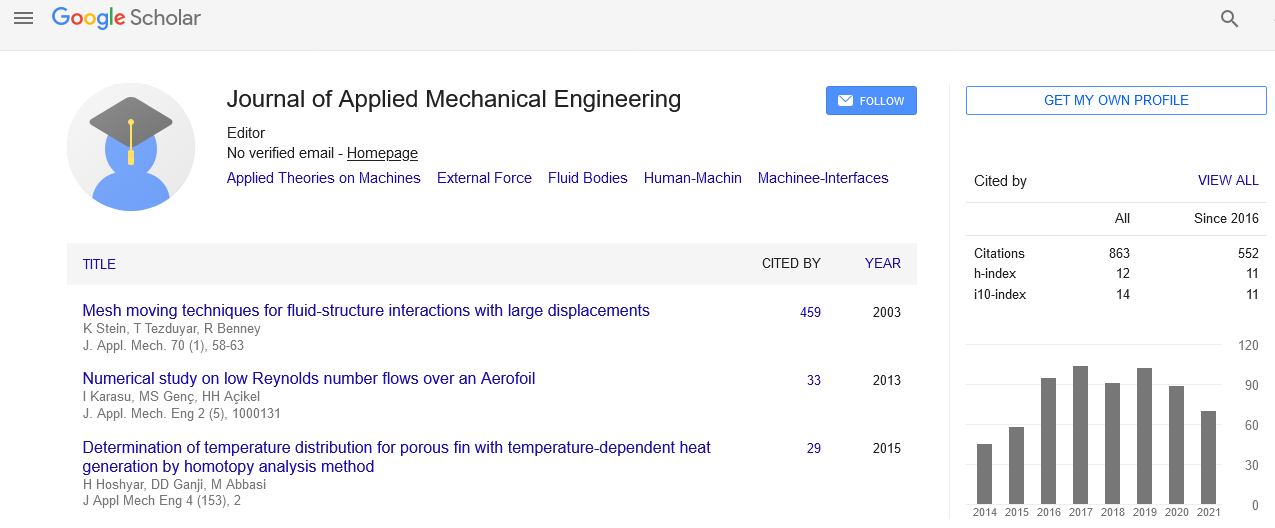Indexed In
- Genamics JournalSeek
- JournalTOCs
- CiteFactor
- RefSeek
- Hamdard University
- EBSCO A-Z
- OCLC- WorldCat
- Publons
- Google Scholar
Useful Links
Share This Page
Journal Flyer

Open Access Journals
- Agri and Aquaculture
- Biochemistry
- Bioinformatics & Systems Biology
- Business & Management
- Chemistry
- Clinical Sciences
- Engineering
- Food & Nutrition
- General Science
- Genetics & Molecular Biology
- Immunology & Microbiology
- Medical Sciences
- Neuroscience & Psychology
- Nursing & Health Care
- Pharmaceutical Sciences
Abstract
Heat Transfer Characterization of Enhanced Condenser Tubes; Comparison with Conventional Type, Utilizing a Developed Design for Test Apparatus
A. Kalendar, T. Galal, A. Al- Saftawi, M. Zedan, S. S. Karar and R. El- shiaty
Estimating the feasibility of intensifying thermal mechanisms in MSF plant is investigated by employing Enhanced Tubing Test Apparatus for heat transfer characterization with conventional type. Utilizing actual Brine water, study the influence of flow speeds on fouling pattern and the effect of tube diameter on its behaviour. Experimental results are discussed for both smooth and corrugated tube, when applying fresh and real brine water on different tube diameters 19.05, 23 and 29.5, on flow speeds 0.1, 0.1645 and 0.2398 m/s. Apparatus (A) has to be redesigned, since problems were developed through its components. Difficulties revealed with former test-rig, are given a careful consideration in assembly of a new one. The modified set-up facilities included a new configured design for the steam condenser, equipped in such a way to minimize mentioned obstacles, dismantling faced problems associated with; circulated pumps, boiler, flow meters and its place of fitting, careful identifying the tested tube characteristics, a wise differentiation between properties of brine and fresh water, a creation of uniform steam temperature distribution inside the rig, preventing a creation of two phase flow and simulating the actual circumstances in real desalination platform. The continuous experimental running hours used by this designed test-rig(B) is 160 hrs. Use is made of two horizontally mounted tubes through which the coolant solution is flowing. Corrugated and smooth tubes are examined at a time to unify the tested conditions on both. The study is carried-out for two different coolants, fresh and brine water. Examining effect of fouling on both corrugated and smooth tube, changing tube diameters and coolant flow speeds on experimental data. Results are provided in the form of: overall heat transfer coefficient with fresh and brine water vs. time for both tubes on different flow speeds, overall heat transfer coefficient with brine water vs. time for both tubes on a critical coolant flow speed with various chosen tube diameters, asymptotic values of overall heat transfer coefficient with fresh water vs. tube diameters for both corrugated and smooth on a critical flow speed, asymptotic values of overall heat transfer coefficient with brine water vs. coolant flow speeds for both corrugated and smooth with a chosen critical tube diameter and the tube fouling resistance vs. time, using tube diameter 23 mm and coolant flow velocity 0.1 m/s. On global look this study is significant to provide a useful correlation; as the studied tube diameter increased; with increasing flow speed expectation is for achieving a higher value of asymptotic overall heat transfer coefficient.

